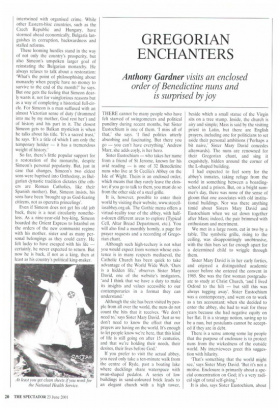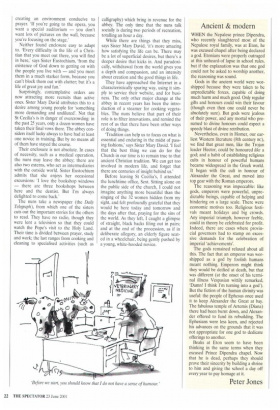GREGORIAN ENCHANTERS
Anthony Gardner visits an enclosed
order of Benedictine nuns and is surprised by joy
THERE cannot be many people who have felt starved of swingometers and political punditry during recent months, but Sister Eustochium is one of them. miss all of that,' she says. 'I find politics utterly absorbing and fascinating. But there you go — you can't have everything.' Andrew Marr, she adds coyly, is her hero.
Sister Eustochium — who takes her name from a friend of St Jerome, known for his avid reading — is one of 32 Benedictine nuns who live at St Cecilia's Abbey on the Isle of Wight. Theirs is an enclosed order, which means that they rarely leave the cloister; if you go to talk to them, you must do so from the other side of a steel grille.
It is, however, possible to enter their world by visiting their website, www.stceciliasabbey.org.uk. The Gothic menu offers a virtual-reality tour of the abbey, with halfa-dozen different areas to explore (Typical Cell, Altar Bread Department, etc.). You will also find a monthly homily, a page for prayer requests and a recording of Gregorian chant.
Although such high-techery is not what you would expect from women whose existence is in many respects mediaeval, the Catholic Church has been quick to take advantage of the World Wide Web. 'Ours is a hidden life,' observes Sister Mary David, one of the website's instigators, 'and I think that we have a duty to make its insights and values accessible to our contemporaries in a format they can understand.'
Although the site has been visited by people from all over the world, the nuns do not count the hits that it receives. 'We don't need to,' says Sister Mary David. lust as we don't need to know the effect that our prayers are having on the world. It's enough to let people know we're here, that this kind of life is still going on after 15 centuries, and that we're holding their needs, their desires, their lives before God.'
If you prefer to visit the actual abbey, you need only take a ten-minute walk from the centre of Ryde, past a boating lake where ducklings share waterspace with swan-shaped pedalos. A series of low buildings in sand-coloured brick leads to an elegant church with a high tower, beside which a small statue of the Virgin sits on a tree stump. Inside, the church is airy and simple; Mass is said by the visiting priest in Latin, but there are English prayers, including one for politicians to set aside their personal ambitions (`Perhaps a bit naive,' Sister Mary David concedes afterwards). The nuns are renowned for their Gregorian chant, and sing it exquisitely, hidden around the corner of the L-shaped building.
I had expected to feel sorry for the abbey's inmates, taking refuge from the world in something between a boardingschool and a prison. But, on a bright summer's day, there was none of the sense of gloom that one associates with old institutional buildings. Nor was there anything timid about Sisters Mary David and Eustochium when we sat down together after Mass; indeed, the pair brimmed with enthusiasm and merriment.
We met in a large room, cut in two by a table. The symbolic grille, rising to the ceiling, was disappointingly unobtrusive, with the thin bars set far enough apart for a determined child to wriggle through them.
Sister Mary David is in her early forties, and enjoyed a distinguished academic career before she entered the convent in 1985. She was the first woman postgraduate to study at Christ Church, 'and I lived Oxford to the hilt — but still this was always tugging away'. Sister Eustochium was a contemporary, and went on to work as a tax accountant; when she decided to enter the abbey, she had to wait for three years because she had negative equity on her flat. It is a strange notion, saving up to be a nun, but postulants cannot be accepted if they are in debt.
There is a sense among some lay people that the purpose of enclosure is to protect nuns from the wickedness of the outside world. My interviewees greet this suggestion with hilarity.
'That's something that the world might see,' says Sister Mary David, 'But it's not a motive. Enclosure is primarily about a special concentration on God; it's a very radical sign of total self-giving.'
It is also, says Sister Eustochium, about creating an environment conducive to prayer. 'If you're going to the opera, you want a special auditorium — you don't want lots of pictures on the wall, because you're focusing on the stage.'
Neither found enclosure easy to adapt to. 'Every difficulty in the life of a Christian that you meet out there, you will find in here,' says Sister Eustochium, 'from the existence of God down to getting on with the people you live with — and you meet them in a much starker form, because you can't block them out with clutter; but it's a life of great joy and fun.'
Surprisingly, contemplative orders are now attracting more recruits than active ones. Sister Mary David attributes this to a desire among young people for 'something more demanding and undiluted'. Not that St Cecilia's is in danger of overcrowding: in the past 25 years, only a dozen women have taken their final vows there. The abbey considers itself lucky always to have had at least one novice in training. But by no means all of them have stayed the course.
Their enclosure is not absolute. In cases of necessity, such as a medical operation, the nuns may leave the abbey; there are also two externs, who act as intermediaries with the outside world. Sister Eustochium admits that she enjoys her occasional excursions: 'I love the bookshop windows — there are three bookshops between here and the dentist. But I'm always delighted to come back.'
The nuns take a newspaper (the Daily Telegraph), from which one of the sisters cuts out the important stories for the others to read. They have no radio, though they were lent a television so that they could watch the Pope's visit to the Holy Land. Their time is divided between prayer, study and work; the last ranges from cooking and cleaning to specialised activities (such as
calligraphy) which bring in revenue for the abbey. The only time that the nuns talk socially is during two periods of recreation, totalling an hour a day.
While there are things that they miss, says Sister Mary David, 'it's more amazing how satisfying the life can be. There may be a lot of superficial desires, but there's a deeper desire that kicks in. And paradoxically, withdrawal from the world gives you a depth and compassion, and an intensity about creation and the good things in life.
They have approached the Internet in a characteristically sparing way, using it simply to service their website, and for business. The only other major change at the abbey in recent years has been the introduction of a steamer for cooking vegetables. The nuns believe that part of their role is to filter innovations, and remind the rest of us that there have been other ways of doing things.
'Tradition can help us to focus on what is essential and enduring in the midst of passing fashions,' says Sister Mary David. 'I feel that the best thing we can do for the Church in our time is to remain true to that ancient Christian tradition. We can get too involved in modern life, and forget that there are centuries of insight behind us.'
Before leaving St Cecilia's, I attended the lunchtime office, Sext. Sitting alone on the public side of the church, I could not imagine anything more beautiful than the singing of the 32 women hidden from my sight, and felt profoundly grateful that they would be here today and tomorrow and the days after that, praying for the sins of the world. As they left, I caught a glimpse of straight, black backs filing out in pairs; and at the end of the procession, as if in deliberate allegory, an elderly figure seated in a wheelchair, being gently pushed by a young, white-hooded novice.



































































 Previous page
Previous page